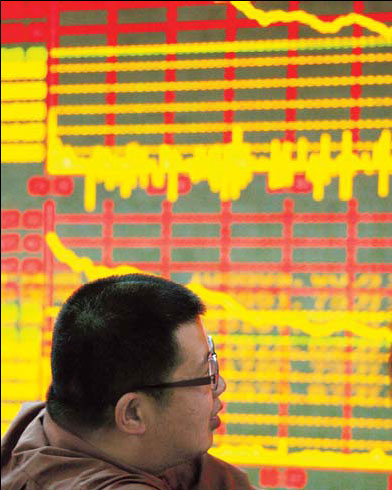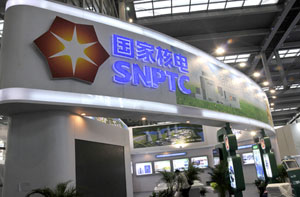Bank shares rally on Huijin buying
Updated: 2011-10-12 09:26
By Gao Changxin (China Daily)
|
|||||||||||
|
An investor monitors stocks at a securities exchange in Huaibei, Anhui province, on Tuesday. Stocks on the Chinese mainland rose for the first time in five days. [Photo/China Daily] |
SHANGHAI - China's banking shares rallied on Tuesday after State-run Central Huijin Investment Ltd started buying shares in the four major State-owned banks to stabilize the stock market.
But analysts said that the small increase in the benchmark Shanghai exchange index will not extend into a long-term rally. They said that it was only a short-term rebound in the A-share market, which fell to a 30-month low of 2,344.79 on Monday.
Industrial and Commercial Bank of China Ltd gained 1.5 percent in Shanghai, the most in six weeks. China Construction Bank Corp, Agricultural Bank of China Ltd (ABC) and Bank of China Ltd all climbed more than 2 percent.
The Shanghai Composite Index, which tracks the bigger part of China's stock market, nudged 0.16 percent higher to 2348.52 to post the first gain in five days.
A resource tax increase on coking coal dragged down coal producers, offsetting banking gains. The index rallied as much as 2.9 percent in intraday trading on Tuesday.
The four banks did better in Hong Kong, where they are also listed, with ABC jumping 12 percent and the other three rising at least 5.8 percent.
Central Huijin Investment Ltd, set up to hold government stakes in the banks, raised its holdings in the big four banks in the secondary market on Monday after the banks' valuations dropped below the level hit during the financial crisis in 2008.
The Shanghai Composite Index has plunged about 16 percent year-to-date amid central government tightening monetary policies to rein in inflation that has been hitting records.
Central Huijin said it will continue with "related market operations" over the next 12 months. But it didn't say how much it will invest and whether it will buy the shares in Hong Kong or Shanghai.
"The move by Central Huijin is a signal that the government has decided to take measures to prop up the stock market," said Wang Jianhui, chief economist with Southwest Securities Co Ltd. "But the effect will be limited because what investors worry most about are the fundamentals of the Chinese and global economies, which have not shown signs of improving."
Last time Central Huijin made a similar move, on Sept 19, 2008, the Shanghai Composite Index posted a 21-percent rally in a week to above 2,300. But the index fell back to 1,664 points a month later.
Wang said the market's short-term response would be more muted this time and the Shanghai Composite Index would advance to 2,450 points at most before retreating.
Xu Guangfu, an analyst with Xiangcai Securities Co Ltd, was more optimistic. He estimated that the rally would continue for as long as two months, with the index increasing 200 to 300 points.
An analyst with a major foreign investment bank in Shanghai, who declined to be identified, interpreted Central Huijin's purchase as a move to raise its ownership, motivated by concern that the banks' repeated offerings will dilute its holdings.
Related Stories
Central Huijin buys stocks in 4 major banks 2011-10-10 16:30
CIC to restructure, split from Huijin 2011-09-01 11:06
- Farm produce prices slightly up last week
- Currency act shortsighted
- Energy links with Russia strengthened
- Nike to invest in China 'very aggressively'
- Tired of long wait for license? Try renting one
- Payments by mobile phone ring up
- Harsh harvest looms for Xinjiang cotton growers
- Transport data raise privacy concerns














